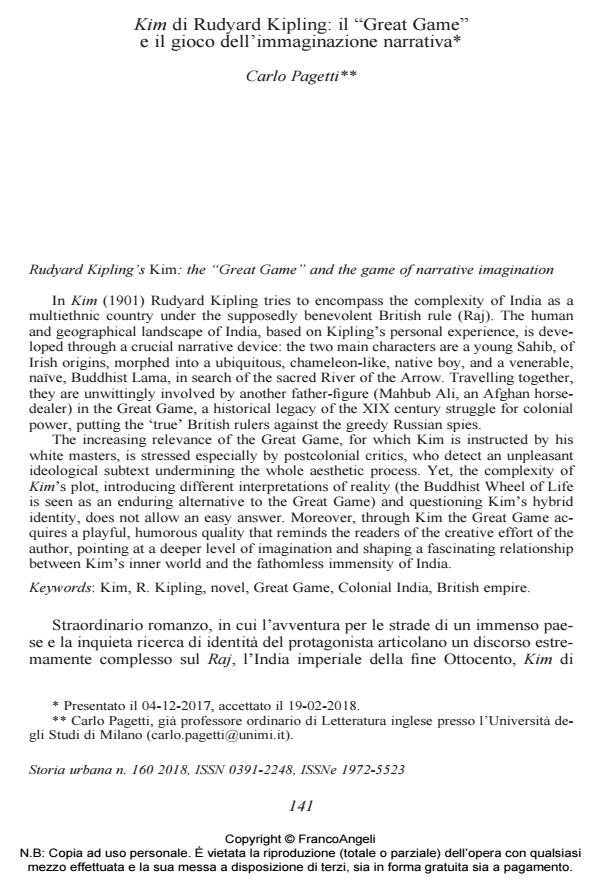Rudyard Kipling’s Kim: the "Great Game" and the game of narrative imagination
Journal title STORIA URBANA
Author/s Carlo Pagetti
Publishing Year 2019 Issue 2018/160
Language Italian Pages 15 P. 141-155 File size 288 KB
DOI 10.3280/SU2018-160005
DOI is like a bar code for intellectual property: to have more infomation
click here
Below, you can see the article first page
If you want to buy this article in PDF format, you can do it, following the instructions to buy download credits

FrancoAngeli is member of Publishers International Linking Association, Inc (PILA), a not-for-profit association which run the CrossRef service enabling links to and from online scholarly content.
In Kim (1901) Rudyard Kipling tries to encompass the complexity of India as a multiethnic country under the supposedly benevolent British rule (Raj). The human and geographical landscape of India, based on Kipling’s personal experience, is developed through a crucial narrative device: the two main characters are a young Sahib, of Irish origins, morphed into a ubiquitous, chameleon-like, native boy, and a venerable, naïve, Buddhist Lama, in search of the sacred River of the Arrow. Travelling together, they are unwittingly involved by another father-figure (Mahbub Ali, an Afghan horsedealer) in the Great Game, a historical legacy of the XIX century struggle for colonial power, putting the ‘true’ British rulers against the greedy Russian spies. The increasing relevance of the Great Game, for which Kim is instructed by his white masters, is stressed especially by postcolonial critics, who detect an unpleasant ideological subtext undermining the whole aesthetic process. Yet, the complexity of Kim’s plot, introducing different interpretations of reality (the Buddhist Wheel of Life is seen as an enduring alternative to the Great Game) and questioning Kim’s hybrid identity, does not allow an easy answer. Moreover, through Kim the Great Game acquires a playful, humorous quality that reminds the readers of the creative effort of the author, pointing at a deeper level of imagination and shaping a fascinating relationship between Kim’s inner world and the fathomless immensity of India. Keywords: Kim, R. Kipling, novel, Great Game, Colonial India, British empire.
Keywords: Kim, R. Kipling, Romanzo, Grande Gioco, India coloniale, Impero britannico
Carlo Pagetti, Kim di Rudyard Kipling: il "Great Game" e il gioco dell’immaginazione narrativa in "STORIA URBANA " 160/2018, pp 141-155, DOI: 10.3280/SU2018-160005